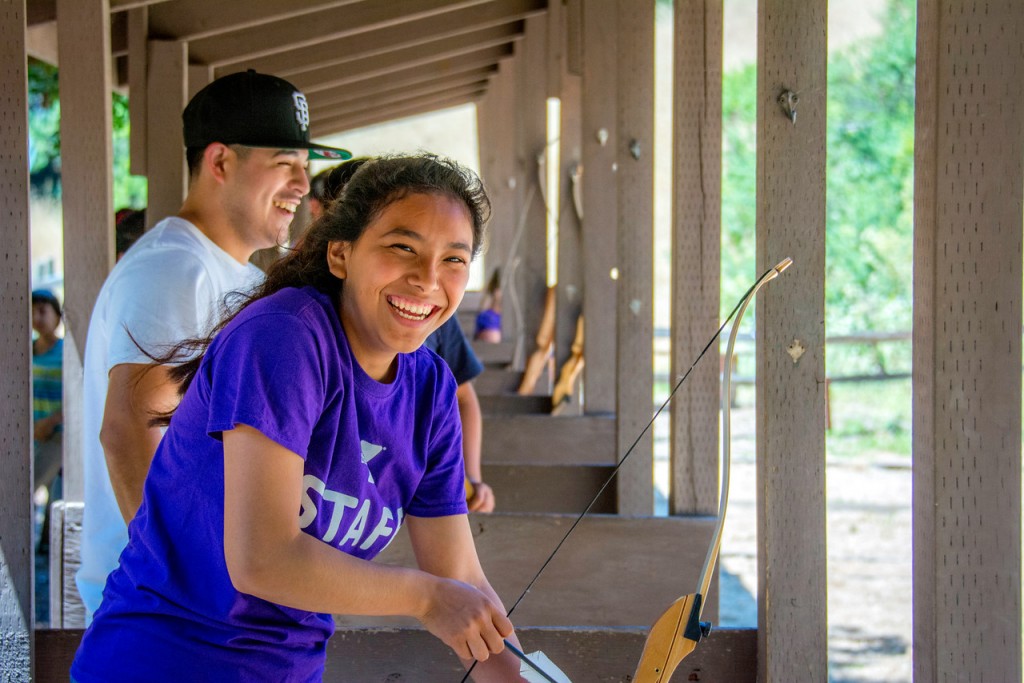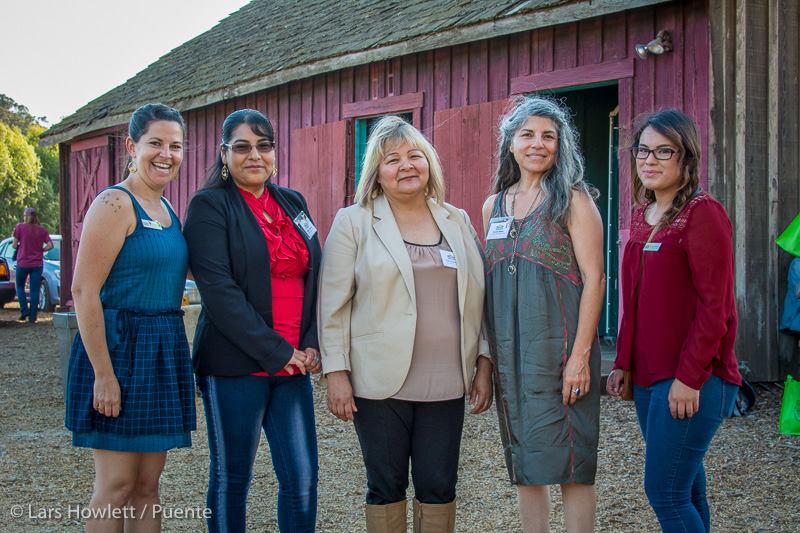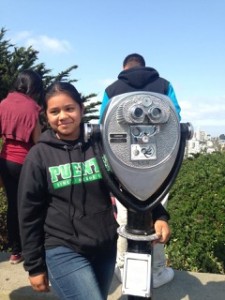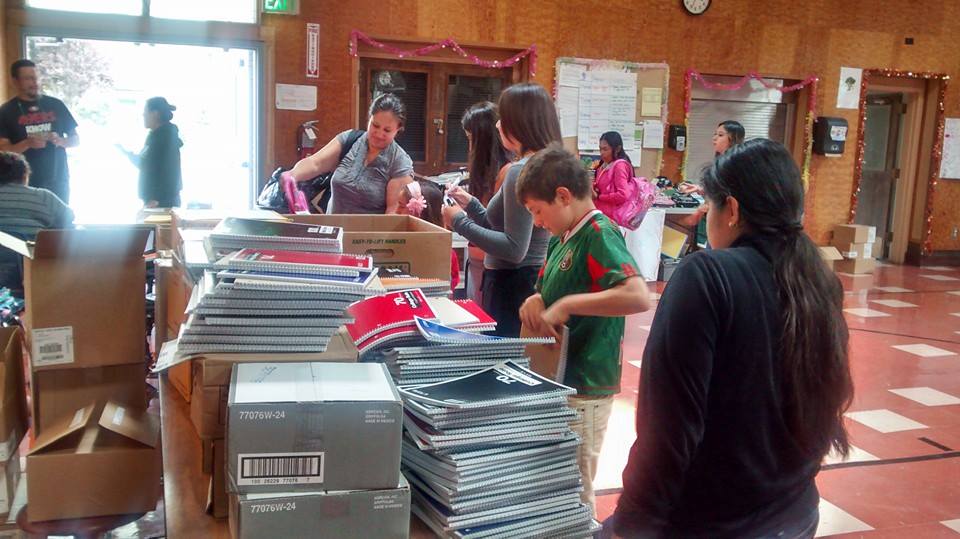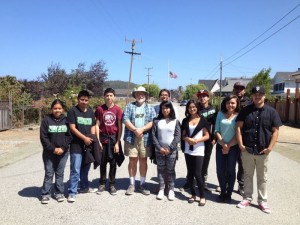You could easily divide the lives of Yesenia Ramirez and her husband and children into the categories of “before” and “after” a moment four years ago.
Ramirez, a mother of four, was employed at a flower nursery on the San Mateo County coast.
“I was working in a place where it was really hot, 110 degrees all the time. I got a lot of headaches. It started in my right eye, and little by little, I started losing vision in my left eye, too,” she says.
The headaches were a serious warning sign. Ramirez had seen a doctor, who dismissed them as allergy-related and sent her home without painkillers. Ramirez noticed her pain would spike at work when she was applying pesticides to the plants in the nursery.
“I wore a breathing mask at work when we were spraying, but even when I used it I got headaches. They told us not to complain and just to do it,” she says.
Eventually, in 2011, the pain drove her to a hospital in Santa Cruz, where emergency room doctors found her eyes so inflamed the veins “were like tree branches,” she says.
From that day onward Ramirez became effectively blind, a result of Vogt-Koyanagi-Harada disease, a rare, lifelong disorder that results in eye inflammation and can only be treated with regular steroid injections. (Her doctor says her vision loss is due to her disorder, but that the heat and pesticides at work hastened her decline).
Several surgeries and procedures later, she has partially regained her eyesight. Her struggles have not only changed her life, they have transformed her family’s lives and inspired her to help other Latino community members to take control of their own access to quality health care.
An empowered mother takes control of her health
Ramirez and her husband have four children: Itzel, 16; Jose, 14: Jazmin, 13; and Daniel, 8. Puente staff members know the family well. Ramirez recently joined Puente staff as a part-time “promotora,” or community health worker – one of four local women who travel to local farms and ranches and connect people with health care services through Puente. When not in the field, she’s a regular in Puente programs. She loves to dance her heart out at Zumba twice a week and also attends ESL classes. And Itzel and Jose are veterans of Puente’s summer Youth Leadership and Development Program.
But in 2011, Ramirez was blind and in pain. She ended up at Stanford Health Care, where doctors said they would treat her for $8,000. Her husband, a dishwasher in a restaurant, thought they should spend the money but Ramirez said no, they couldn’t afford it. “The pain after that was too much to handle. A doctor at Stanford told me he would treat me whether I had insurance or not,” she says.
Ramirez did have insurance through San Mateo County – a health plan for low-income participants called ACE, which she got after signing up through Puente. But using the insurance was complicated. “I had a lot of problems with the insurance at Stanford. I’d have to go to San Mateo for medications. They always made me wait. It took a long time or there weren’t any medications. They would tell me, ‘Why did you come here?’” recalls Ramirez.
San Mateo County Public Health Nurse Karen Hackett, who is stationed with Puente, stepped in to guide Ramirez through the tangle of bureaucracy. Puente also initially helped Ramirez schedule bus pickups to get to her appointments. “Karen Hackett showed me how to fight,” she says. “Almost everything I’ve learned, she showed me.”
But as her condition persisted, there were other problems. She had to have cataract surgery and an implant in her left eye to reduce the inflammation. She couldn’t work, and her husband also missed a lot of work because he was taking her to her appointments. With four children to feed and clothe, the family was in financial trouble.
“I came to Puente for help paying rent, and they gave me money to pay rent for two months,” Ramirez says.
At home, the family struggled to find normalcy. Ramirez couldn’t do much more than make sure her kids went off to school. She had plenty of help at home from local relatives, including her sister Evelia, but she disliked being homebound in pain and constantly asked family members to help her take walks. The elder children were asked to do housework and help watch their younger siblings. Itzel, the eldest, reacted with anger and rebelled whenever she could. She struggled at school, where her grades began to plummet.
“I was frustrated with the situation and with myself. I felt like I couldn’t really handle her state much longer. It was hard to watch,” she recalls.
Jose, her younger brother, also struggled with his anger and eventually saw a counselor at Puente to help him understand and manage his emotions. “It was cool talking to him about my problems, and how to solve them,” he says.
Slowly, after countless treatments, Ramirez began to see again. Reading and driving are still beyond her reach, but she started attending Zumba classes again and taking morning walks with her friends in the Pescadero walking group. And as they matured, her children noticed how their mother never seemed to complain about how much she had lost. In fact, she seemed to gain confidence, not lose it.
“I saw them stick needles in her eyes, really long needles. I was freaked out,” says Itzel. “But she took everything very well. It didn’t affect her at all.”
Itzel remembers hearing a doctor tell her mother that she would never be able to see again. “We got out of that appointment and she said, ‘What do they know? I’ll get my eyesight back.’ That’s when I realized how strong my mom was.”
Ramirez was further emboldened to take control of her own medical appointments.
“I used to wait for Karen to be around to tell her my eyes hurt. Now I just take care of it. When I have a problem, I call the emergency room and tell them someone has to see me. They tell me when to come in,” she says. She also books her own bus pick-ups now.
That sense of confidence moved Ramirez to apply for her position as a Puente promotora. Molly Wolfes is Puente’s Community Health Coordinator. She works closely with Ramirez, who uses her own story to help motivate other people to exercise their rights within the health system.
“She has gone full circle in her health. She started out as someone who had to reach out to Puente for her health issues – and now she’s the one helping other people navigate through the health system,” says Wolfes. “It rings true because people know she’s worked hard to get where she is.”
On her first day out in the field, Wolfes remembers she and Ramirez met a father who said his daughter had a rash and needed to see a doctor. The father worked seven days a week and could not get time off from work to take her to an appointment over the hill.
“Yesenia turned to me and said, ‘Can I take her? I can go with her on the bus.’ It didn’t even occur to me that this could be an option,” says Wolfes.
Puente’s Executive Director Kerry Lobel remarks that “at Puente so often ‘just doing our job’ changes people’s lives. And changing lives is a remarkable and humbling thing—especially when participants in Puente programs then join our team and change our lives in return.”
Hope and transformation
Ramirez is now closer than ever with her children, who have banded together around their mother and her needs. “Physically and emotionally, she’s more connected to us now. I listen to her more. I try to obey her, to do everything she wants,” says Jose.
He and Itzel now barely fight at all. They go to Santa Cruz together and do laundry for their mom. Jose tidies the living room and carries heavy things around. Itzel babysits Daniel and prepares some meals, although she laughingly says most of her cooking is “really bad.”
“Before, when we came home, the house was clean and there would be a meal waiting for us. We were spoiled by our mom,” says Itzel. “Now she needs our help for stuff.”
Itzel has also transformed her academic performance at school. She now earns excellent grades and looks forward to applying to a four-year university – a scary but exciting prospect. She has joined every single sports team at Pescadero High School, including volleyball, basketball and soccer. She is also the only girl on the boys’ baseball team.
“I needed a challenge. Participating in sports got me through that little bit of anger I still had, so I could be home and ready to help my mom,” she says. “I’ve always played sports, but I’m more of a team player now.”
Jose says his sister has set an example for the whole family. “I look up to her because she takes everything on. She even plays baseball with the guys. And she gets all her work done, even if it takes her a long time. Which is something pretty cool about her.”
This holiday season, Ramirez and her family will celebrate what they have – love, strength, hope, and the support of their community. Ramirez doesn’t know whether her condition will improve or worsen. But she is determined to push herself as much as possible.
“I don’t like to think about this, because I know it’s forever – my whole life,” she says. “I try to do everything I can now, because after that I don’t know.”
People in our community have a lot of internal resources and resiliency, and sometimes they just need an extra hand. Your support makes it possible for Puente to empower families like Yesenia’s, providing resources, support, and skill building. Please consider a holiday donation today. Thank you!

